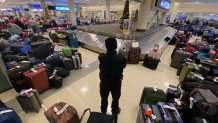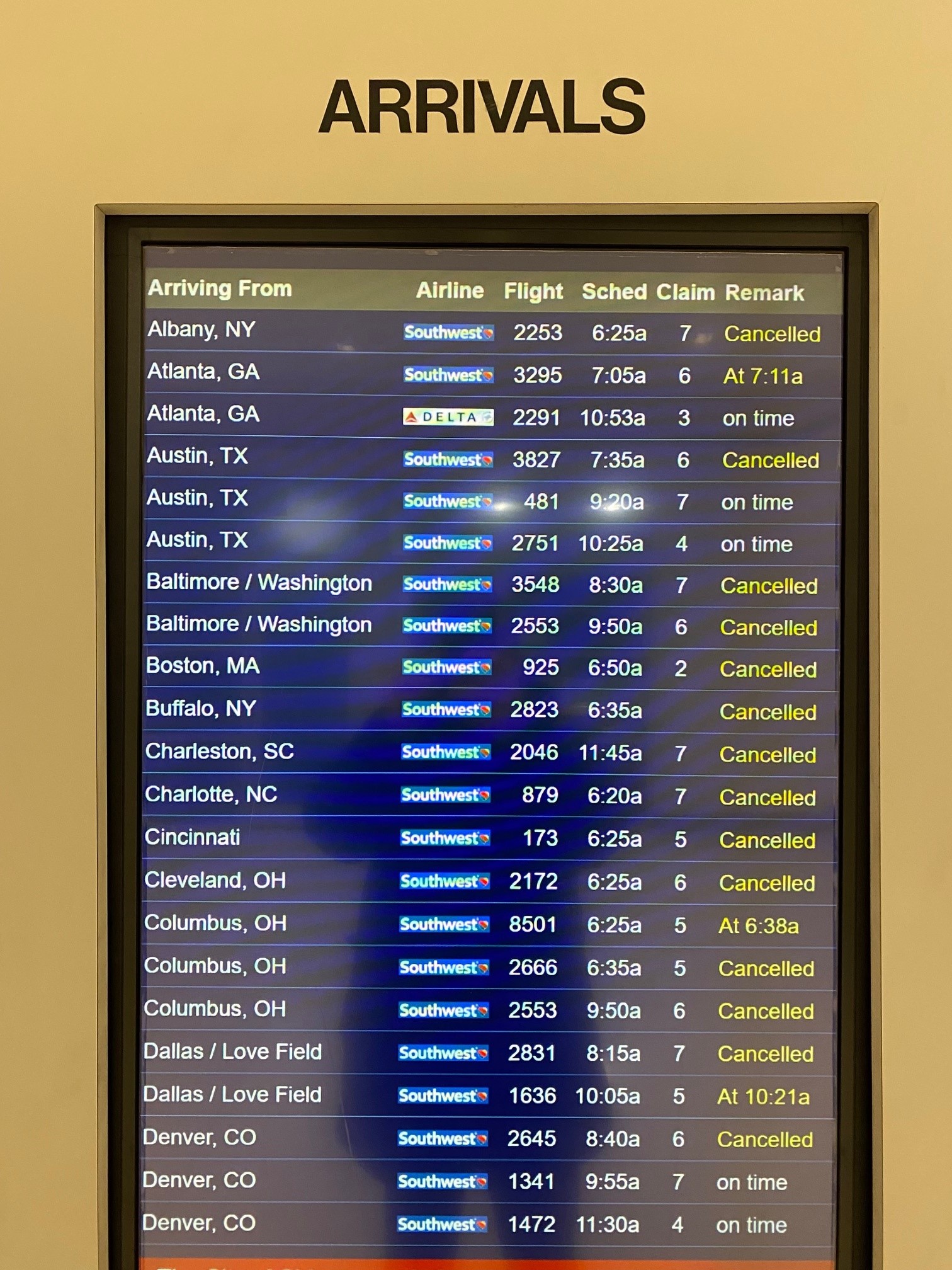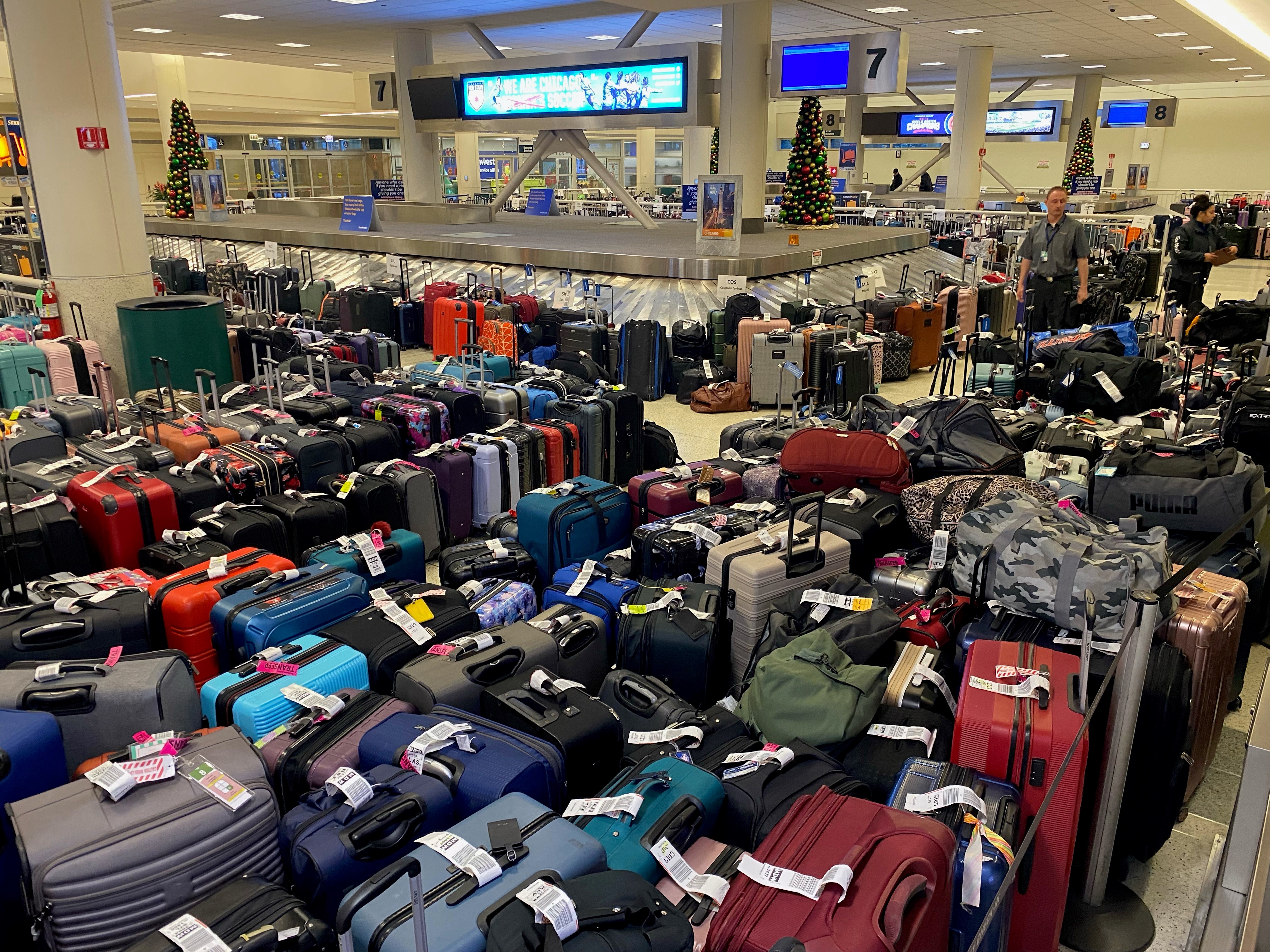The winter storm blamed for Southwest Airlines' travel "meltdown," which left thousands of travelers stranded or without luggage after the holiday weekend, didn't seem to affect other airlines in the same way -- and there's a reason for that.
Travelers dealt with widespread difficulties in the lead-up to the Christmas holiday weekend as deadly winter weather swept across the U.S., but even as some of the effects of the storm lingered, much of the travel disruptions were cleared by this week -- except for those who flew on Southwest Airlines.
As other airlines recovered, Southwest scrubbed thousands of flights at the start of the week and another 2,500 flights Wednesday and 2,300 on Thursday.
The airline blamed lingering effects from the storm and "scheduling issues" for the chain reaction that left many unable to make it home from their holiday celebrations.
At Chicago's Midway Airport, hundreds of passengers were left stranded, luggage has been piling up and delays turned from hours to days. Similar scenes were reported at airports across the U.S.

It wasn't just passengers who were stranded.
According to a release from TWU Local 556, Southwest Airlines Flight Attendant Union of more than 18,000 members, "thousands" of crew members are also stranded across the country, "some forced to sleep on cots in airports, some in hotels without power or water, and far too many working long hours well past acceptable duty days, and more."
"We know the demands of holiday travel," the union's statement goes on to say. "We know winter storms....We know about stepping up and putting in long work hours when we are called to do so; we are flight attendants. But at this point, the many years of failure by management, despite many unions’ demands to modernize, has left flight attendants fatigued, stranded, hungry and cold."
Feeling out of the loop? We'll catch you up on the Chicago news you need to know. Sign up for the weekly Chicago Catch-Up newsletter.
Captain Casey Murray, SWAPA president, on Tuesday called the situation "disgraceful," "catastrophic," and a "failure at every level."
Transportation Secretary Pete Buttigieg, who has criticized airlines for previous disruptions, said “meltdown” was the only word he could think of to describe this week’s events at Southwest. He noted that while cancellations across the rest of the industry declined to about 4% of scheduled flights, they remained above 60% at Southwest.
From the high rate of cancellations to customers’ inability to reach Southwest on the phone, the airline’s performance has been unacceptable, Buttigieg said. He vowed to hold the airline accountable and push it to reimburse travelers.
The disparity has triggered a closer look at Southwest operations by the U.S. Department of Transportation, which called the rate of cancellations “unacceptable," and sought to ensure that the carrier was sticking by its obligations to stranded customers.
Illinois Gov. J.B. Pritzker also said he has been in contact with federal officials regarding the cancellations in recent days, demanding that the airline be held accountable.
“I am closely following the ongoing challenges consumers are dealing with regarding their canceled Southwest flights,” Pritzker said. “I have spoken with Secretary Buttigieg to express the frustration of thousands of Illinoisans who have been stranded and missed out on quality time with their families or who have had to call off work because they couldn’t make it back home.”
But Southwest Airlines was undone by a combination of factors including an antiquated crew-scheduling system and a network design that allows cancellations in one region to cascade throughout the country rapidly. Those weaknesses are not new — they helped cause a similar failure by Southwest in October 2021.
Here's an explanation of what happened:
Why Did Southwest See More Flight Cancellations Than Other Airlines?
In a statement released by Southwest Monday, the airline said it was severe weather that "forced daily changes to our flight schedule at a volume and magnitude that still has the tools our teams use to recover the airline operating at capacity," and that the airline has made the decision to "continue operating a reduced schedule by flying roughly one third of our schedule for the next several days."
A video update posted on Southwest Airline's website Tuesday from CEO Bob Jordan echoed this sentiment, saying that "cities where large numbers of scheduled flights simultaneously froze as record bitter cold brought challenges for all airlines."
"Our network is highly complex and the operation of the airline counts on all the pieces, especially aircraft and crews remaining in motion to where they're planned to go," Jordan said. "The tools we use to recover from disruption serve us well, 99 percent of the time; but clearly, we need to double down on our already existing plans to upgrade systems for these extreme circumstances so that we never again face what's happening right now."
Jordan concluded his message by saying the airline is "optimistic to be back on track before next week."
However, according to travel expert Kurt Ebenhoch, it wasn't the storm that caused this disruption.
"If this was just purely a weather problem, all the carriers would have having the same difficulties," Ebenhock told NBC 5 in an interview.
According to Captain Michael Santoro, Vice President of Southwest Airlines Pilot Association, while severe weather was the catalyst, it was "vastly outdated" IT infrastructure and scheduling system that's different from other carriers that led to the meltdown.
"We fly a point-to-point network which can put our crews in the wrong places, without airplanes, mismatched. Our software cant keep track of it," Santoro said Tuesday, adding that the union brings up this problem yearly.
"They never update it. They never invest the money and resources they need to. So, we continue to have these issues," Santoro.
Leaders of Southwest’s labor unions have warned for years that the airline’s crew-scheduling system, which dates to the 1990s, was inadequate, and the CEO acknowledged this week that the technology needs to be upgraded.
The other large U.S. airlines use “hub and spoke” networks in which flights radiate out from a few major or hub airports. That helps limit the reach of disruptions caused by bad weather in part of the country.
Southwest, however, has a “point to point” network in which planes crisscross the country during the day. This can increase the utilization and efficiency of each plane, but problems in one place can ripple across the country and leave crews trapped out of position.
Those issues don't explain all the complaints that stranded travelers made about Southwest, including no ability to reach the airline on the phone and a lack of help with hotels and meals.
What's next?
For those holding out hope, it doesn't appear like things will be getting better soon.
Southwest said earlier this week it anticipates "additional changes with an already reduced level of flights as we approach the coming New Year holiday travel period."
"As we continue the work to recover our operation, we have made the decision to continue operating a reduced schedule by flying roughly one third of our schedule for the next several days," the statement read.
It goes on to say that they are "working to reach customers whose travel plans will change."
"On the other side of this, we’ll work to make things right for those we’ve let down, including our Employees," the statement concludes. "We recognize falling short and sincerely apologize."
According to Southwest Airlines' website, "Customers holding any Southwest reservation from Sunday, December 25 through Monday, January 2, may rebook in the original class of service or travel standby (within 14 days of their original date of travel between the original city-pairs and in accordance with our accommodation procedures) without paying any additional charge."
In his video, Jordan said Southwest would operate a reduced schedule for several days but hoped to be “back on track before next week.”
Southwest told customers affected by canceled or delayed flights between Dec. 24 and Jan. 2 to submit receipts. The airline said, "We will honor reasonable requests for reimbursement for meals, hotel, and alternate transportation.”



